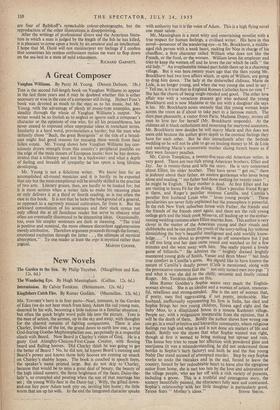A Great Composer
Vaughan Williams. By Percy M. Young. (Dennis Dobson. 18s.) THIS is the second full-length book on Vaughan Williams to appear in the last three years and it may be doubted whether this is either necessary or wise in the case of a composer still living. Hubert Foss's book was devoted as much to the man as to his music, but Mr. Young, with the advantage of plenty of music-type examples, goes steadily through the whole of Vaughan Williams's output. No writer would be so foolish as to neglect or ignore such a composer's character or the opinions of one who, for all his peaceableness, has never ceased to expound often unpopular ideas in trenchant terms. Insularity is a hard word, provincialism a harder; but the man who defiantly chose "Bach, the great Bourgeois" as the title of a broad- cast might find good reasons for rescuing these words from their fallen estate. Mr. Young shows how Vaughan Williams has con- sciously drawn strength from this country's peripheral positibn on the edge of the main stream of European music: how he has demon- strated that a tributary need not be a backwater: and what a depth of feeling and breadth of sympathy he has spent a long lifetime developing.
Mr. Young is not a felicitous writer. We know him for an accomplished all-round musician and it is hardly to be expected that any but the most exceptional will be notably skilled in the practice of two arts. Literary graces, then, are hardly to be looked for; but it is more serious when a writer fails to make his meaning plain or only delivers it at a third or fourth reading, as is too often the case in this book. It is not that he lacks the background of a general, as opposed to a narrowly musical cultivation, far from it. But the awkward convolution of his sentences and their slack syntax not only offend the at all fastidious reader but serve to obscure what often are eventually discovered to be interesting ideas. Occasionally, too, even his simpler sentences are dark in meaning. "The triad is positive and nominal, the more obscure discordant agglomeration merely attributive. Therefore argument proceeds through the former, emotional excitation through the latter . . , the ultimate of mystical absorption." To one reader at least the ergo is mystical rather than


























 Previous page
Previous page